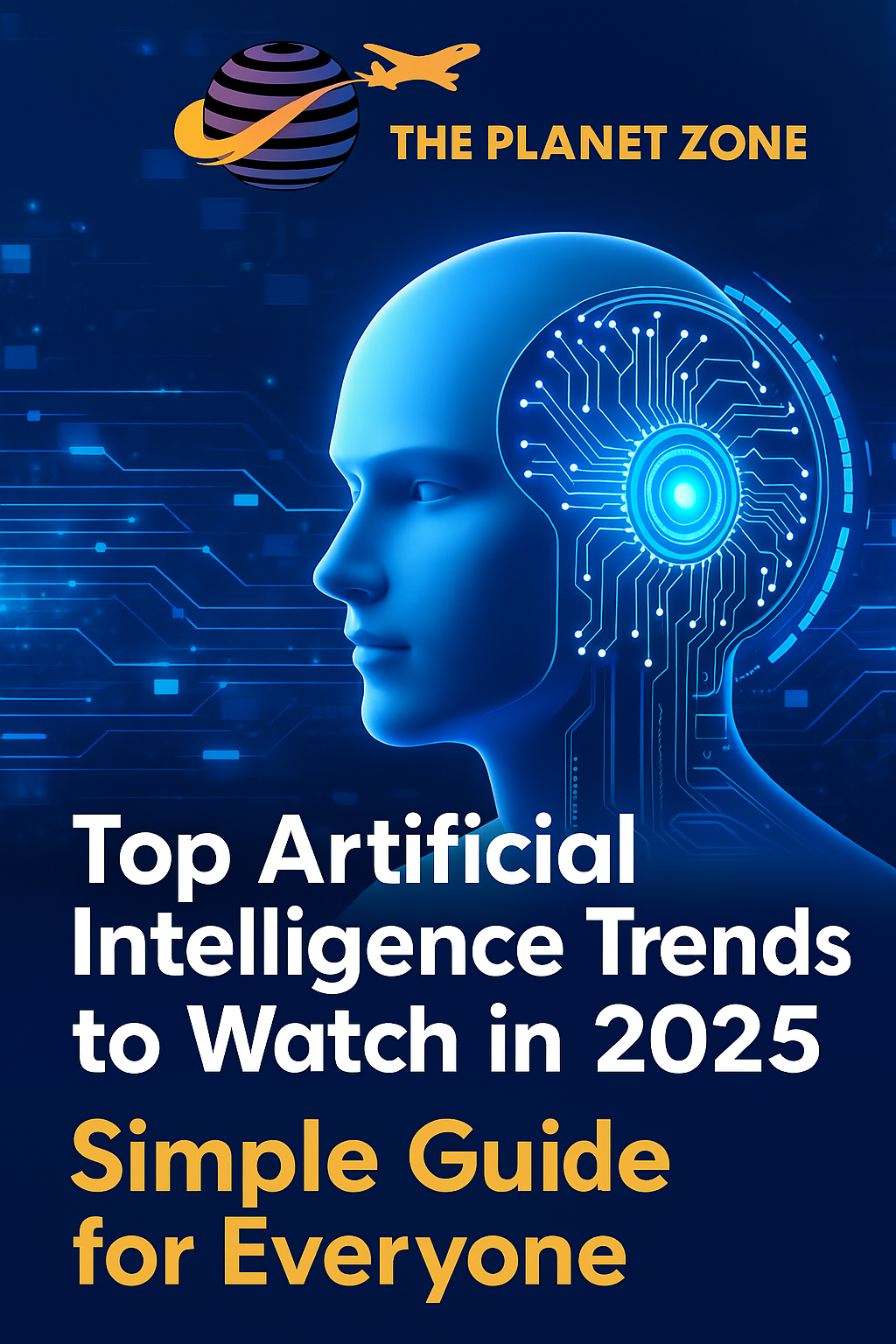Introduction
Technology is changing the world very fast. One of the most powerful technologies today is called artificial intelligence, also known as AI. But many people still ask, What is Artificial Intelligence: A Simple Guide for Everyone.
At the planet zone
, we believe that even children should be able to understand new technology. That is why in this article, we will explain AI in very easy words, show how it works, and share where we see it in daily life.
What is Artificial Intelligence?
Artificial intelligence means when a computer or machine can think, learn, and solve problems like a human. It is like giving a computer a smart brain.
For example:
When you talk to Alexa or Siri, you are using AI.
When YouTube or Netflix suggests a movie you might like, that is AI.
When Google Maps shows you the best way to travel, AI is behind it.
So, if you are wondering what is artificial intelligence: a simple guide for everyone, the answer is: it is smart technology that helps machines act like humans.
How Does Artificial Intelligence Work?
AI works by learning from data. Think of it like this:
Collecting Information – AI looks at a lot of data, like pictures, words, or numbers.
Learning – It studies patterns in that data.
Decision Making – After learning, it can make choices or give answers.
Example: If you show AI many pictures of cats and dogs, it will slowly learn the difference. Later, when you show a new picture, it can say, “This is a cat” or “This is a dog.”
Types of Artificial Intelligence
AI is not just one thing. There are different types:
Narrow AI – This AI does one job well. For example, Google Translate.
General AI – This AI can do many jobs like a human, but it is still being developed.
Super AI – This is a future idea where AI may become smarter than humans.
At the planet zone, we believe that today we mostly use Narrow AI in apps, websites, and machines.
Where Do We See AI in Daily Life?
Artificial intelligence is everywhere around us, even if we do not notice. Some common uses are:
Phones – Voice assistants, face unlock, smart cameras.
Shopping – Online stores suggest products based on what we like.
Health – Doctors use AI to read scans and find diseases faster.
Education – Smart apps help students learn in a fun way.
Cars – Self-driving cars use AI to move safely.
Entertainment – Music and video apps suggest songs or shows.
This shows why people want to know what is artificial intelligence: a simple guide for everyone because it touches almost every part of our life.
Benefits of Artificial Intelligence
AI has many advantages:
Saves Time – Tasks that take hours can be done in minutes.
Helps in Healthcare – Doctors can treat patients faster.
Makes Life Easy – From smart homes to online shopping.
Safer Travel – Self-driving cars reduce accidents.
Better Learning – Students get personalized study help.
At the planet zone, we explain that AI is not just for experts. It is for everyone, from kids to adults.
Challenges of Artificial Intelligence
AI also has some challenges:
Job Loss – Some people worry AI may replace human workers.
Mistakes – Sometimes AI can give wrong answers.
Data Safety – Protecting personal information is very important.
Too Much Dependence – If we depend only on AI, we may stop thinking for ourselves.
That is why it is important to use AI carefully and wisely.
The Future of Artificial Intelligence
The future of AI looks very bright. In the coming years, AI may:
Help teachers in classrooms.
Support farmers with smart machines.
Improve medicine and treatments.
Protect the environment with smart energy use.
Create art, music, and even stories.
The world will see AI in every field. At the planet zone, we believe AI will work as a partner to humans, not as a replacement.
Tips to Understand AI Easily
If you want to understand AI better, here are some easy tips:
Look at examples around you like chatbots or smart devices.
Read simple blogs from trusted sites like the planet zone.
Try free AI apps to see how they work.
Ask simple questions and learn step by step.
Why Learning About AI is Important
Even if you are a student in 4th standard, learning about AI is helpful. The world is moving fast, and AI is part of our daily life. Knowing what is artificial intelligence: a simple guide for everyone helps us:
Use technology in a smart way.
Stay safe online.
Be ready for future jobs.
Become creative by mixing human ideas with AI help.
What We Learned
So, what is artificial intelligence: a simple guide for everyone? It is the smart power inside computers that helps them think and act like humans. AI is in our phones, cars, hospitals, schools, and even in games.
It makes life easy, saves time, and opens new opportunities. But it also comes with challenges like job loss or wrong answers.
The key is to use AI as a helper, not as a boss.
Conclusion
Now you clearly understand what is artificial intelligence: a simple guide for everyone. It is not a scary subject but a smart friend in technology. From helping doctors to guiding students, AI is everywhere.
At the planet zone, we believe the future will be full of possibilities when humans and AI work together. The goal is not to replace humans but to make life smarter, safer, and more exciting.
So the next time someone asks you about artificial intelligence, you can explain it in simple words. AI is our helpful partner in building a better tomorrow.